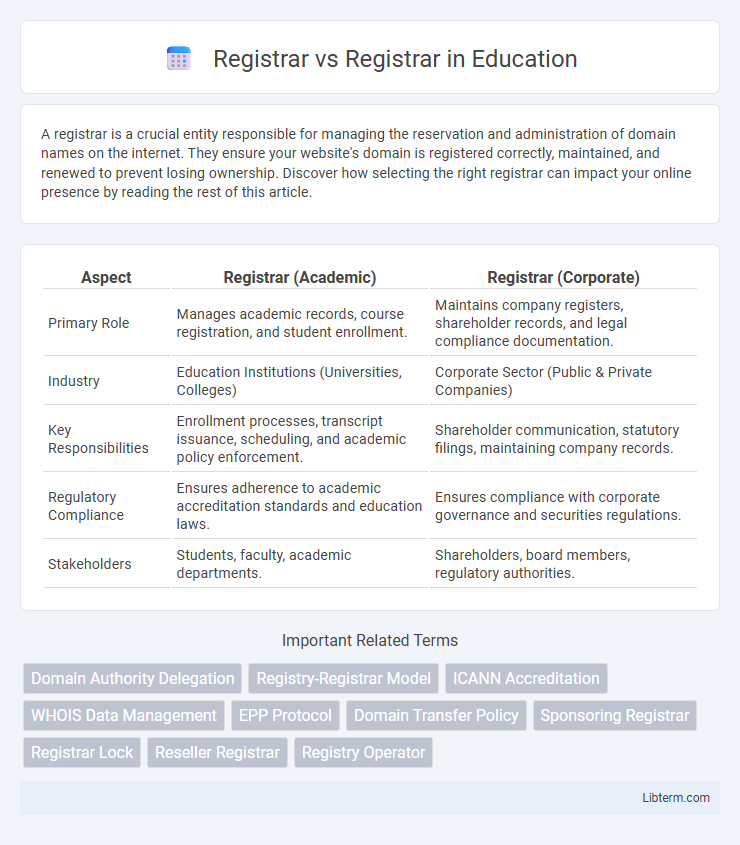A registrar is a crucial entity responsible for managing the reservation and administration of domain names on the internet. They ensure your website's domain is registered correctly, maintained, and renewed to prevent losing ownership. Discover how selecting the right registrar can impact your online presence by reading the rest of this article.
Table of Comparison
| Aspect | Registrar (Academic) | Registrar (Corporate) |
|---|---|---|
| Primary Role | Manages academic records, course registration, and student enrollment. | Maintains company registers, shareholder records, and legal compliance documentation. |
| Industry | Education Institutions (Universities, Colleges) | Corporate Sector (Public & Private Companies) |
| Key Responsibilities | Enrollment processes, transcript issuance, scheduling, and academic policy enforcement. | Shareholder communication, statutory filings, maintaining company records. |
| Regulatory Compliance | Ensures adherence to academic accreditation standards and education laws. | Ensures compliance with corporate governance and securities regulations. |
| Stakeholders | Students, faculty, academic departments. | Shareholders, board members, regulatory authorities. |
Understanding the Term "Registrar
The term "Registrar" in different contexts refers either to a business entity responsible for managing the reservation of domain names or to an academic official in educational institutions who oversees student records and course registrations. Domain registrars are accredited by ICANN or national authorities to facilitate domain name registration and management, ensuring proper domain ownership and DNS settings. Academic registrars handle enrollment processes, maintain transcripts, and verify academic credentials, playing a critical role in institutional administration and compliance.
Registrar in Academic Institutions
A registrar in academic institutions manages student records, enrollment processes, and course scheduling to ensure accurate and efficient administration. This role involves maintaining academic transcripts, verifying student credentials, and coordinating graduation requirements to support institutional compliance and student success. Unlike domain registrars in technology, academic registrars focus on educational data management and institutional policy enforcement.
Registrar in Domain Name Registration
A Registrar is an accredited organization authorized by ICANN or a national registry to manage domain name registrations, serving as the interface between registrants and registries. Unlike resellers or hosting providers, a Registrar maintains domain ownership records, facilitates renewals, transfers, and DNS management. Key players in domain registration include GoDaddy, Namecheap, and Google Domains, which provide user-friendly platforms for purchasing and managing domain names.
Key Roles and Responsibilities
A registrar primarily handles administrative tasks such as maintaining student records, enrollment verification, and managing academic calendars, ensuring accurate documentation within educational institutions. In contrast, a domain registrar is responsible for registering internet domain names, maintaining domain databases, and facilitating the transfer or renewal processes to ensure continuous online presence. Both roles require meticulous record-keeping and compliance with regulatory standards, but they operate in distinct sectors with specialized knowledge.
Major Differences Between Academic and Domain Registrars
Academic registrars primarily manage student records, course enrollment, and graduation requirements within educational institutions, ensuring compliance with academic policies and maintaining transcript accuracy. Domain registrars, on the other hand, specialize in the registration, transfer, and management of internet domain names, operating under the regulations of ICANN and providing DNS services. The key distinction lies in their functional focus: academic registrars handle institutional administration of student data while domain registrars facilitate domain name system transactions for websites.
Similarities Between the Two Registrars
Both Registrar and Registrar serve as authorized entities responsible for managing domain name registrations and maintaining accurate domain information within the Domain Name System (DNS). Each registrar ensures compliance with Internet Corporation for Assigned Names and Numbers (ICANN) regulations, facilitating domain transfers, renewals, and updates securely. Customer support services and user-friendly interfaces are common features designed to help registrants efficiently manage their domain portfolios across both types of registrars.
Importance of Registrars in Their Respective Fields
Registrars play a crucial role in various industries by maintaining accurate records and ensuring data integrity. In healthcare, medical registrars manage patient information that supports effective treatment and compliance with regulations. University registrars oversee student records, course enrollments, and academic credentials, enabling smooth administrative operations and institutional accountability.
Qualifications and Skills Required
Registrars typically require a bachelor's degree in health administration or related fields, strong organizational skills, and proficiency in medical records management systems. Registrars often need specialized certification, such as Certified Tumor Registrar (CTR) credentials, demonstrating expertise in data collection and compliance with healthcare regulations. Both roles demand attention to detail, effective communication abilities, and familiarity with electronic health record (EHR) software for accurate patient data handling.
Common Challenges Faced by Registrars
Registrars commonly face challenges such as managing high volumes of student records while ensuring data accuracy and compliance with privacy regulations like FERPA and GDPR. They also encounter difficulties in integrating legacy systems with modern software to streamline enrollment, grading, and transcript services. Maintaining effective communication across departments and adapting to evolving academic policies further complicate their administrative responsibilities.
Choosing the Right Registrar for Your Needs
Selecting the right domain registrar depends on factors like pricing, customer support, domain management tools, and additional services such as privacy protection and SSL certificates. Evaluating registrars like GoDaddy, Namecheap, and Google Domains based on your specific needs ensures a seamless domain registration experience. Prioritize registrars with strong reputations, transparent policies, and user-friendly interfaces to safeguard your online presence effectively.
Registrar Infographic

 libterm.com
libterm.com